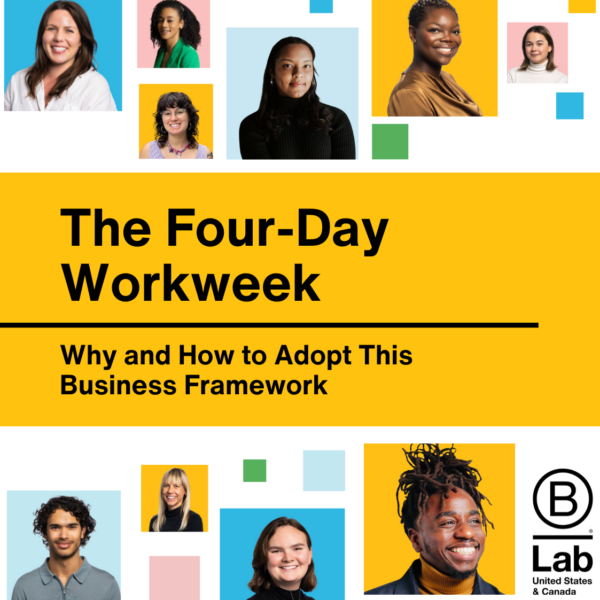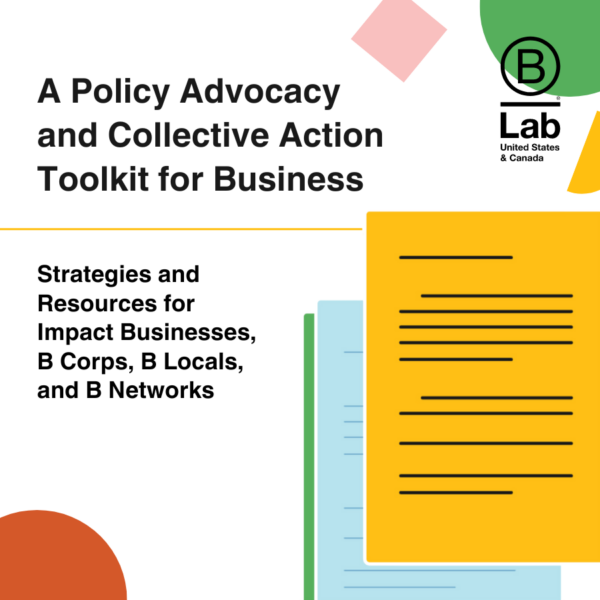Reimagining Work: Four-Day Workweek Offers New Model for Work and Life
October 30, 2024
B Corps Share Practices and Trainings That Support Transition to Four-Day Workweek
Models for working have undergone various changes over time. As more companies and employees look to improve work-life balance, the standard five-day, 40-hour workweek model is being reconsidered. Some companies are turning to a four-day workweek instead, where employees work fewer hours while maintaining the same pay and output — and they’re finding that the change benefits not only employees but businesses.
A recent study from the United Kingdom found that one year after 61 U.K. companies opted to participate in a four-day workweek pilot study, 89% of the companies continued to maintain the structure. The study found the four-day workweek led to increased efficiency, happier employees, and lower staff turnover rates.
But what does a four-day workweek look like in practice, and what changes must a company make to transition? Is it an option for all types of companies, or are some better suited than others?
As businesses focused on driving positive impact, some Certified B Corporations — small and large — are among those at the forefront of this change. Montreal-based B Corp Boite Pac, a consulting firm that guides companies through the transition to a four-day workweek, helps answer these and other questions, and B Corp Unilever Australia and New Zealand shares its experience with a trial of the four-day workweek.

Why and How to Adopt This Business Framework
This guide from B Lab U.S. & Canada explores how the four-day workweek is gaining traction as a long-term framework for worker resilience and bottom-line strength. It offers business examples, lessons, and resources to help organizations make the shift.
Steps for Transitioning to a Four-Day Workweek
A four-day workweek is not just a reconfiguration of the 40-hour workweek — it’s a different model for people’s working lives. Alexandra Lamoureux, partner and consultant at Boite Pac, said Boite Pac uses the 100-80-100 model, meaning employees receive 100% of their salary while working 80% of their hours and retaining 100% productivity.
Lamoureux says businesses see numerous benefits from a four-day workweek, chief among them a reduction in employee burnout and turnover. She said the reduction in working hours reduces burnout by as much as 70%, and Boite Pac’s clients have seen a 55% to 60% reduction in employee turnover. These outcomes not only increase employee well-being and motivation but also benefit business finances, culture, and client base.
“It’s a clear incentive with tangible results that solves multiple problems in the workplace,” Lamoureux says.
One example is Blue Street Capital, which provides business financing services. The California-based firm reduced working hours by 20% and saw its revenue increase by 30% in the first year. Other indirect benefits include emissions reductions from the decrease in driving and the advancement of gender equity. Women are more than four times more likely than men to work part-time to balance work and family life, so Lamoureux says reducing everyone’s hours actually helps level the playing field for those women.
“By putting everyone on a 32-hour week, it’s a huge step toward gender equality,” she says. “When women can work the same hours as men, they have greater access to promotions, leadership roles, and professional growth.”
Despite these benefits, Lamoureux says there are some common misconceptions that could deter some companies from considering a four-day workweek. One is that 24-hour businesses cannot do it. Lamoureux says they can utilize a rotation model where employees have different days off. She says studies show the four-day workweek can be effective across all types of businesses, from manufacturing and other manual jobs to larger companies with complex business models. In both cases, the model can be adapted or different models can be used for varied sectors of the business.
Another misconception is that business leaders can’t participate. However, Boite Pac encourages leaders to be part of the process and “get their hands dirty.” Some also falsely assume that a four-day workweek is for “lazy” people who don’t want to work, but Lamoureux emphasizes that is simply not true. “It’s for teams willing to reassess their processes and do more in less time, so actually, you can’t be lazy to do that,” she says.
Boite Pac works with businesses to prepare for and manage the transition to a four-day workweek. This process includes initial employee surveys, the selection of a model and development of an action plan, productivity training, a pilot period, and follow-up surveys. “The preparation is really important,” she says. “It’s a very human-centered organizational change, so you need to honor that.”
The initial survey asks employees about topics such as why they want to transition to a four-day workweek and any concerns about the transition. Productivity training provides instruction on efficiency and time management strategies. This includes the Pomodoro time management method based on 25-minute stretches of focused work and batching, which involves grouping similar smaller tasks together to complete at once. Employees also receive guidance on when and how to step away from meetings when their presence isn’t pertinent.
Following about a month of preparation and productivity training, companies take the next transition step and have no meetings on a certain day, such as Friday. Employees continue to work that day but focus on reducing their hours in preparation for the next step: a pilot of the four-day workweek that can last from three to six months. After the pilot, employees are surveyed about the experience and the company can decide whether to adopt the new model.

Get Strategies and Resources for Advocacy and Action
B Lab U.S. & Canada developed this downloadable guide to support businesses in their advocacy and collective action work. Download the guide for resources, examples, and other action-oriented information.
Unilever Australia and New Zealand Pilot the Four-Day Workweek
B Corp Unilever Australia and New Zealand (ANZ) is conducting a trial of the four-day workweek. Unilever ANZ initially began the trial at Unilever New Zealand and then, based on those results, began trialing the model in Australia as well.
“Reimagining the future of work is not just a moral responsibility; there is also a strong business case,” Unilever ANZ says in a response to questions. “Since embracing a flexible working culture, we’ve seen increased engagement and productivity, greater retention, and fewer sick days, resulting in significant cost savings for our business.”
Specifically, as part of the New Zealand trial, the vast majority of the 80 Unilever ANZ employees reported feeling engaged, and absenteeism dropped 34%. Individual well-being also improved, with stress dropping 33%. Meanwhile, feelings of strength and vigor at work increased by 15%, and work-life conflict fell by 67%. Stakeholders and partners also viewed the trial favorably, with 100% agreeing that the New Zealand team completed work on time and to high quality. Importantly, the New Zealand trial showed strong results against business targets, including revenue growth.
The format at Unilever ANZ is also based on the 100-80-100 principle with a focus on stimulating productivity through training and tools, and maintaining 100% of outputs. All leave and public holiday balances remain the same, and there is no mandated day or time off. Teams are encouraged to work through logistics and develop individual and team plans that ensure business continuity.
“While the four-day workweek is founded on the same principles across the board, that doesn’t mean it looks the same for every team or employee,” Unilever ANZ says. “What’s right for one team or employee’s life stage won’t always work for another. For some, this gift of time may take the form of a couple of hours per day or two half days per week — whatever works best for them, their team, external customers, and the company.”
Technology has helped Unilever ANZ reduce employee hours and increase productivity. Early on, Unilever ANZ shifted from traditional email communication to platforms like Microsoft Teams, which helped streamline workflows and save time. More recently, the company has embraced generative AI tools like Adobe Firefly and Microsoft Copilot, which Unilever ANZ says has been instrumental in automating routine tasks, fostering creativity, and further enhancing efficiency across the business.
A desire to innovate prompted Unilever ANZ to pilot a four-day workweek. The company says it’s constantly exploring new ways of working to ensure it meets the evolving needs and expectations of its team members while delivering triple-bottom-line performance — profit, planet, and society — and staying competitive.
“This is about trying new ways to remove the barriers that potentially limit value creation and slow us down, and focusing our energies on creating impact and delivering results,” the B Corp says.
When it comes to information other companies would find helpful, Unilever ANZ shared its list of four-day workweek myths. The list includes eight misconceptions about the four-day workweek, such as that the four-day workweek is “just a three-day weekend,” that customers/stakeholders will suffer, and that it makes it harder to have a good office culture. More information about Unilever’s trial of the four-day workweek in Australia and New Zealand is available on the company’s website.
-

-

Champions Retreat
The Importance of Well-Being and Personal Healing for Racial Equity Work
Read More -

-

Sign Up for our B The Change Newsletter
Read stories on the B Corp Movement and people using business as a force for good. The B The Change Newsletter is sent weekly.
